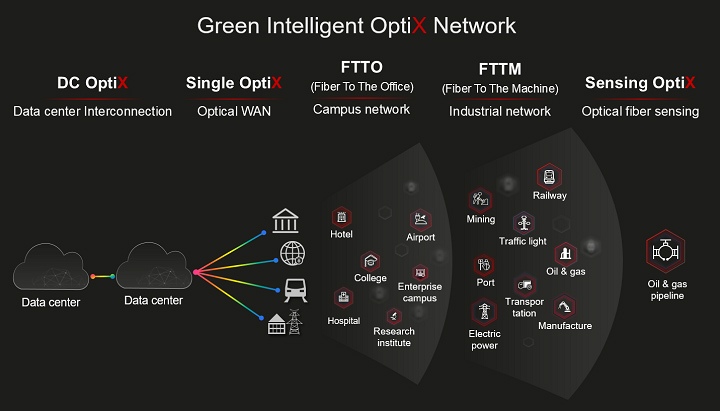This site uses cookies. By continuing to browse the site you are agreeing to our use of cookies. Read our privacy policy>
![]()
This site uses cookies. By continuing to browse the site you are agreeing to our use of cookies. Read our privacy policy>
![]()
Produits, solutions et services pour les entreprises
[Barcelona, Spain, March 2, 2022] At the Mobile World Congress 2022 (MWC 2022), Richard Jin, Vice President of Huawei and President of the Optical Business Product Line, released the Green Intelligent OptiX Network for enterprises. It provides five innovative scenario-based solutions — FTTO (Fiber To The Office), FTTM(Fiber To The Machine), Single OptiX, DC OptiX, and Sensing OptiX — for empowering industrial digitalization.

Huawei Unveils the Green Intelligent OptiX Network
FTTO solution: By integrating the technical advantages of IP and optical products, Huawei has launched the Fiber To The Office (FTTO) solution to build green and simplified campus networks. This solution simplifies the network architecture from three layers to two layers, ensuring no extra-low voltage (ELV) room is required. Moreover, the unique P2MP architecture reduces the investment of optical modules by 50%. Additionally, optical terminals support plug-and-play and swap-and-play, improving O&M efficiency by 50%. Further, Huawei has launched the OptiXstar P871E, the industry's first panel ONU that supports 10 Gbps bandwidth, and the industry's smallest 10G ONU OptiXstar S890H.
FTTM solution: This solution applies to scenarios such as factories, subways, coal mines, ports, and highways, and provides deterministic low latency and high reliability, meeting the network requirements of industrial scenarios. At ports, the Fiber To The Machine (FTTM) network offers deterministic ultra-low latency so that operators can control machines remotely from 100 km away, greatly improving container operation efficiency. FTTM also ensures intrinsic safety for underground networks (such as underground networks of coal mines), eliminating the risk to safety from electric sparks. At intersections, the innovative FTTM distributed architecture uses only one optical cable and one electrical cable to replace hundreds of cables in a traditional solution, improving engineering efficiency by 80%.
Single OptiX solution: Huawei has released the Native Hard Pipe (NHP) network solution. This solution supports fifth-generation hard pipe technology known as Optical Service Unit (OSU), and is compatible with Pulse Code Modulation (PCM), Synchronous Digital Hierarchy (SDH), Optical Transport Network (OTN), and other hard pipe technologies. The NHP network integrates both transmission and access networks for the first time, whereby OSU pass-through technology ensures E2E physical isolation and high reliability of services. This technology has a wide application prospect in electric power and subway scenarios. The extending of hard pipes downwards to access networks enables the amalgamation of power distribution automation with smart inspection, or metro passenger information systems with automated fare collection systems over one network, improving reliability and efficiency.
DC OptiX solution: Combining the advantages of storage and optical communications products, Huawei has released the Storage-Optical Connection Coordination (SOCC) solution. This solution uses an optical network to detect link faults and enables fiber path switching within 5 milliseconds. Additionally, it can monitor fiber network jitter in real time and notify storage devices. This solution enables the switching of I/O channels within 1 second, ensuring zero data loss and greatly improving network reliability. Furthermore, Huawei has upgraded the Data Center Interconnect (DCI) system's capacity from 88 Tbps to 96 Tbps per fiber, reducing fiber leasing costs and improving operation efficiency for customers.
Sensing OptiX solution: With 30 years of optical technology innovation and application experience, Huawei has launched its first optical sensing product — OptiXsense EF3000, which is based on research outcomes of intelligent sensing algorithms. This product is mainly used in oil and gas pipeline scenarios, helping enterprises build a new unattended inspection mode. As a result, the identification rate of pipeline threat events has reached 97%. Xu Xiaoliang, Director of the Optical Fiber Affairs Dept of Shandong Jihua Gas, commented, "Jihua has performed a field technical test using Huawei's optical sensing products. This test proves that the report accuracy is significantly higher than that of the industry. To build upon this joint project, we will continue to collect and update samples onsite to recognize as many incident types as possible, explore more accurate recognition algorithms, and provide more efficient technical assurance for safety management in the oil and gas industry."
The MWC 2022 is taking place from February 28 to March 3 in Barcelona, Spain. Huawei will showcase enterprise products and solutions at Booth 1H50, Hall 1, Fira Gran Via.